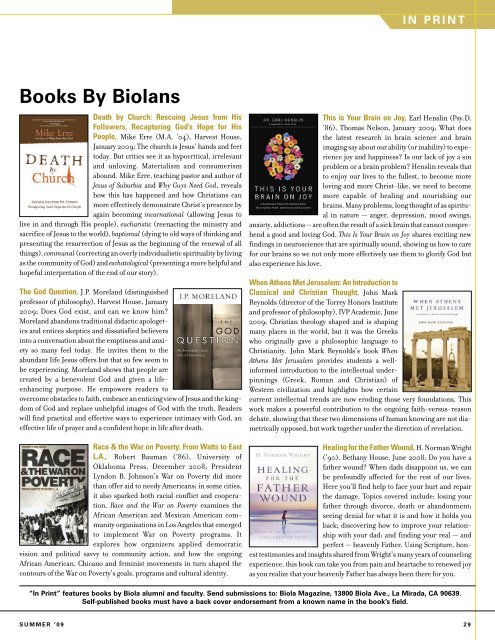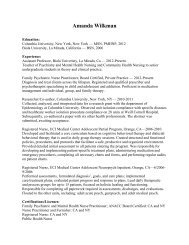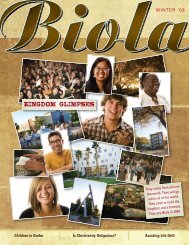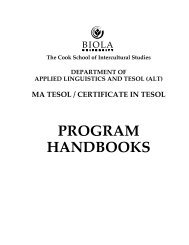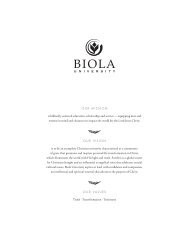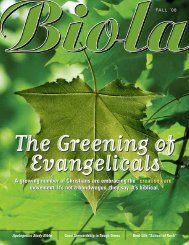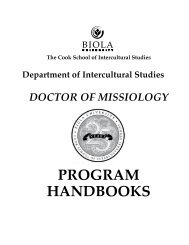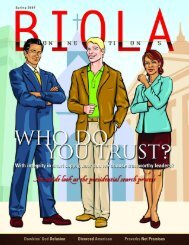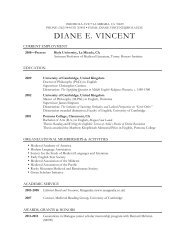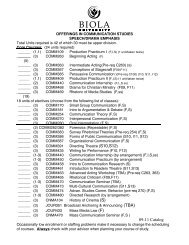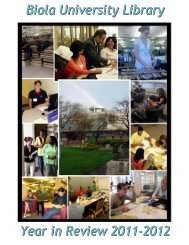In God We Trust? - Biola University
In God We Trust? - Biola University
In God We Trust? - Biola University
You also want an ePaper? Increase the reach of your titles
YUMPU automatically turns print PDFs into web optimized ePapers that Google loves.
Books By <strong>Biola</strong>ns<br />
Death by Church: Rescuing Jesus from His<br />
Followers, Recapturing <strong>God</strong>’s Hope for His<br />
People, Mike Erre (M.A. ’04), Harvest House,<br />
January 2009; The church is Jesus’ hands and feet<br />
today. But critics see it as hypocritical, irrelevant<br />
and unloving. Material ism and consumerism<br />
abound. Mike Erre, teaching pastor and author of<br />
Jesus of Suburbia and Why Guys Need <strong>God</strong>, reveals<br />
how this has happened and how Christians can<br />
more effectively demonstrate Christ’s presence by<br />
again becoming incarnational (allowing Jesus to<br />
live in and through His people), eucharistic (reenacting the ministry and<br />
sacrifice of Jesus to the world), baptismal (dying to old ways of thinking and<br />
presenting the resurrection of Jesus as the beginning of the renewal of all<br />
things), communal (correcting an overly individualistic spirituality by living<br />
as the community of <strong>God</strong>) and eschatological (presenting a more helpful and<br />
hopeful interpretation of the end of our story).<br />
The <strong>God</strong> Question, J.P. Moreland (distinguished<br />
professor of philosophy), Harvest House, January<br />
2009; Does <strong>God</strong> exist, and can we know him?<br />
Moreland abandons traditional didactic apologetics<br />
and entices skeptics and dissatisfied believers<br />
into a conversation about the emptiness and anxiety<br />
so many feel today. He invites them to the<br />
abundant life Jesus offers but that so few seem to<br />
be experiencing. Moreland shows that people are<br />
created by a benevolent <strong>God</strong> and given a lifeenhancing<br />
purpose. He empowers readers to<br />
overcome obstacles to faith, embrace an enticing view of Jesus and the kingdom<br />
of <strong>God</strong> and replace unhelpful images of <strong>God</strong> with the truth. Readers<br />
will find practical and effective ways to experience intimacy with <strong>God</strong>, an<br />
effective life of prayer and a confident hope in life after death.<br />
Race & the War on Poverty: From Watts to East<br />
L.A., Robert Bauman (’86), <strong>University</strong> of<br />
Oklahoma Press, December 2008; President<br />
Lyndon B. Johnson’s War on Poverty did more<br />
than offer aid to needy Americans; in some cities,<br />
it also sparked both racial conflict and cooperation.<br />
Race and the War on Poverty examines the<br />
African American and Mexican American community<br />
organizations in Los Angeles that emerged<br />
to implement War on Poverty programs. It<br />
explores how organizers applied democratic<br />
vision and political savvy to community action, and how the ongoing<br />
African American, Chicano and feminist movements in turn shaped the<br />
contours of the War on Poverty’s goals, programs and cultural identity.<br />
I N P R I N T<br />
This is Your Brain on Joy, Earl Henslin (Psy.D.<br />
’86), Thomas Nelson, January 2009; What does<br />
the latest research in brain science and brain<br />
imaging say about our ability (or inability) to experience<br />
joy and happiness? Is our lack of joy a sin<br />
problem or a brain problem? Henslin reveals that<br />
to enjoy our lives to the fullest, to become more<br />
loving and more Christ-like, we need to become<br />
more capable of healing and nourishing our<br />
brains. Many problems, long thought of as spiritual<br />
in nature — anger, depression, mood swings,<br />
anxiety, addictions — are often the result of a sick brain that cannot comprehend<br />
a good and loving <strong>God</strong>. This Is Your Brain on Joy shares exciting new<br />
findings in neuroscience that are spiritually sound, showing us how to care<br />
for our brains so we not only more effectively use them to glorify <strong>God</strong> but<br />
also experience his love.<br />
When Athens Met Jerusalem: An <strong>In</strong>troduction to<br />
Classical and Christian Thought, John Mark<br />
Reynolds (director of the Torrey Honors <strong>In</strong>stitute<br />
and professor of philosophy), IVP Academic, June<br />
2009; Christian theology shaped and is shaping<br />
many places in the world, but it was the Greeks<br />
who originally gave a philosophic language to<br />
Christianity. John Mark Reynolds’s book When<br />
Athens Met Jerusalem provides students a wellinformed<br />
introduction to the intellectual underpinnings<br />
(Greek, Roman and Christian) of<br />
<strong>We</strong>stern civilization and highlights how certain<br />
current intellectual trends are now eroding those very foundations. This<br />
work makes a powerful contribution to the ongoing faith-versus-reason<br />
debate, showing that these two dimensions of human knowing are not diametrically<br />
opposed, but work together under the direction of revelation.<br />
Healing for the Father Wound, H. Norman Wright<br />
(’90), Bethany House, June 2008; Do you have a<br />
father wound? When dads disappoint us, we can<br />
be profoundly affected for the rest of our lives.<br />
Here you’ll find help to face your hurt and repair<br />
the damage. Topics covered include: losing your<br />
father through divorce, death or abandonment;<br />
seeing denial for what it is and how it holds you<br />
back; discovering how to improve your relationship<br />
with your dad; and finding your real — and<br />
perfect — heavenly Father. Using Scripture, honest<br />
testimonies and insights shared from Wright’s many years of counseling<br />
experience, this book can take you from pain and heartache to renewed joy<br />
as you realize that your heavenly Father has always been there for you.<br />
“<strong>In</strong> Print” features books by <strong>Biola</strong> alumni and faculty. Send submissions to: <strong>Biola</strong> Magazine, 13800 <strong>Biola</strong> Ave., La Mirada, CA 90639.<br />
Self-published books must have a back cover endorsement from a known name in the book’s field.<br />
S U M M E R ’ 0 9 2 9


